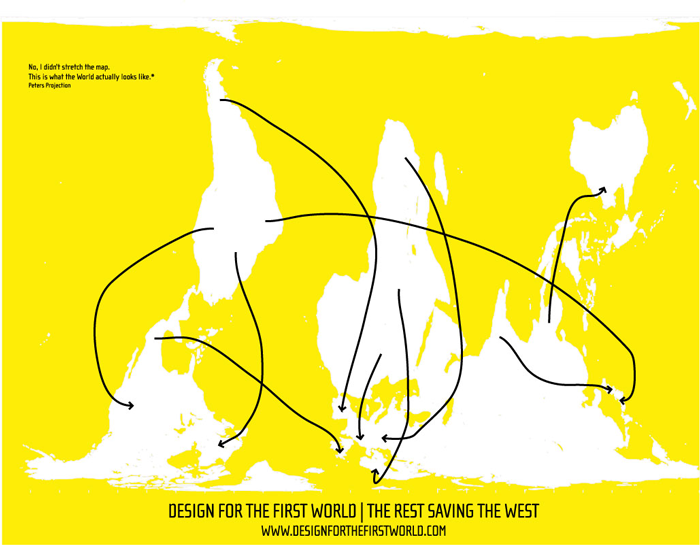2010 is the International Year of the First World in Need
Threatened by obesity, overconsumption of environmentally unsound mass-produced goods, an aging population with a low birth rate, and socially disruptive clashes between immigrants and existing populations, Western countries have failed to control their problems and desperately need outside intervention. Or at least that’s the partly tongue-in-cheek idea behind Design for the First World (Dx1W), a competition that seeks solutions to the rich world’s most pressing problems from designers and thinkers in the third world. Why? Because “the First World problems demand Simple Third World solutions.” The website elaborates:
We have been focusing our energy and resources on trying to solve our Developing World problems to become more like the First World. But perhaps it is time that we, the so-called Third World minds, focused our energy and creativity on solving some of the First World problems. We will have a brighter future to look forward to, and perhaps this can help us rethink and approach our current problems from a different perspective.
 Contest entrants have to choose one of four program areas: “reducing obesity; addressing aging population and low birth rate; reducing consumption rate of mass produced goods; and integrating the immigrant population.” Only people born and currently living in the developing world (the website provides a list, cribbed from the IMF, of countries that qualify) can apply. Entries will be judged by an international panel, and the winner gets a cash prize and space in a New York gallery exhibition.
Contest entrants have to choose one of four program areas: “reducing obesity; addressing aging population and low birth rate; reducing consumption rate of mass produced goods; and integrating the immigrant population.” Only people born and currently living in the developing world (the website provides a list, cribbed from the IMF, of countries that qualify) can apply. Entries will be judged by an international panel, and the winner gets a cash prize and space in a New York gallery exhibition.
The contest, created by Carolina Vallejo, a Colombia native and graduate student in NYU’s Interactive Technologies Program, is meant to propose subversive answers to some very familiar and fundamental development-related questions. What does it really mean to be developed? If developed countries have so many problems, are we (developing countries) sure that’s where we want to be heading? Why does the West think they have a monopoly on innovative development solutions?
But the idea that the rest should be saving the West is vulnerable to the same critiques as its inverse. Isn’t it just as easy to misunderstand rich country problems as poor country problems? Should you really lump together Iowa, Iceland, and Italy into one category called “First World”? Contest entrants are born abroad and live abroad, possibly just as removed from and ignorant of the problems they’re designing for as a misguided Idaho missionary is from the “orphans” of post-earthquake Haiti. Does the developing world think we’re just some monolithic mass of non-baby producing, over-consuming, immigrant-hating old people? And hey, are you calling us fat?
One final question: is Dx1W a spoof, or a real contest? Is it supposed to produce real solutions, or just give the West a taste of its own medicine? Ms. Vallejo manages to suggest it’s both at the same time.
Perhaps Dx1W will generate some brilliant ideas. And if not? Well, at least we in the rich West will know what it feels like to be stereotyped and misunderstood.
--
The deadline to submit entries to the contest is May 30, 2010. Check the Dx1W site for contest rules.
 From Aid to Equality
From Aid to Equality
